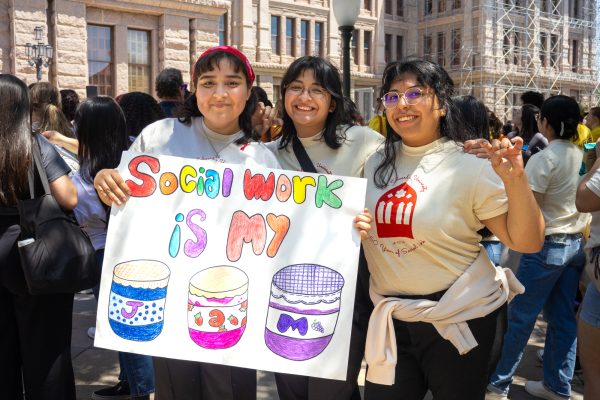Panel ‘#SorryNotSorry’ explores women’s compulsion to apologize
The Multicultural Leadership Board hosted a panel titled #SorryNotSorry about the ins and outs of why women feel the need to over-apologize. The discussion ended with the opportunity for the audience to engage and ask questions about the issues presented.
The discussion was held on Sept. 22. Senior Jesylyn Schuh, the women’s events coordinator, overlooked the panel and directed the main topic questions to the panel throughout the night.
The panel consisted of Associate Professor of communication Innes Mitchell, Professor of Sociology Rachael Neal and St. Edward’s University Alumna Manisha Verma.
Mitchell began the discussion by defining the word sorry in eight different ways; three of which were an apology, an excuse and an expression of goodwill. He says sorry is a reflex to establish goodwill so people will like you and help you.
He further explained how women, in general, are taught to be obedient and this affects how they portray themselves. He continued to explain that the overuse of the word sorry is a way to appear less aggressive and bossy.
The main question of the night was: why do women apologize as much as they do? Most of the answers revolved around the fact that in society “femininity and assertiveness don’t usually go together,” as stated by Neal.
This statement was backed up by a recent study Neal had read over the summer. The study showed that women who negotiated their salaries came across as difficult to their employers. Women who start to show any signs of power or strength are automatically seen as a threat rather than equals in their fields.
One audience member, Tracy Perales, commented on how she felt she needed to step back and allow others to talk even in a room devoted to the subject of women empowerment.
“There was so much more I wanted to say than I did because I went into that submissive state,” Perales said. “I had way more questions than I asked. I thought when others were talking I would just give them the floor.”
A few of the women in the audience commented on the small number of men in the audience. In a discussion about women’s roles in society, men need to be not only present, but good listeners on the topic.
“The default for gender issues is women’s issues,” Mitchell said. “But if they do not get involved, the change will never be made.”
A next event planned by the Multicultural Leadership Board entitled All Hail the V will be held Nov. 3.
Follow me @joanna_ariola






